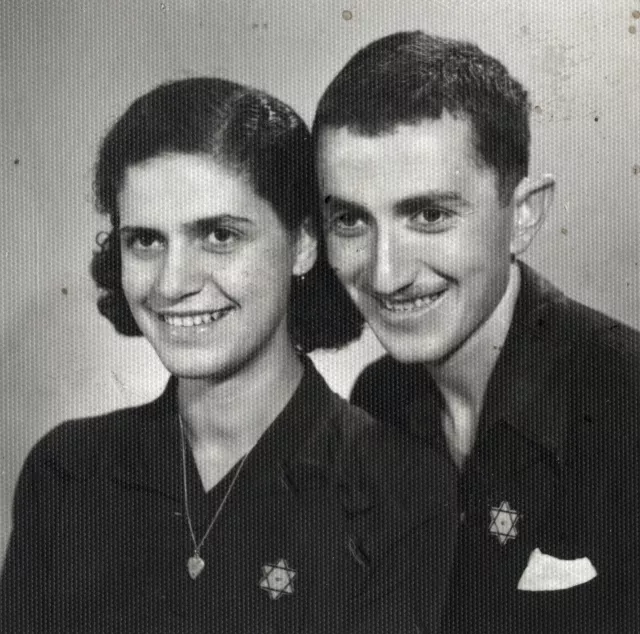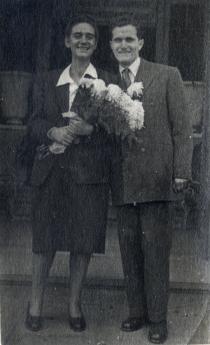Roza and Leon Anzel at their engagement
In this photo you can see me and my husband Leon. A photo from our engagement. There is an inscription in ink on the back of the photo that was probably put there in later years : 'An engagement photo of Leon Anzhel and Roza Varsano, 1943.' There is a stamp of a photo shop - Photo Shop 'Mimoza' Vratsa, and an inscription in pencil: 'Sofia, Vratsa during the internment.'
Larry and I are wearing yellow star badges. The photo was taken in a studio in Sofia because the engagement took place in the capital city before we were interned.
I met Leon Anzhel, my future husband, in the chitalishte. He was a cheerful, natural and pleasant - a nice person to talk to. With him we often discussed the topics presented in the lectures or the books we were reading at the time. One day he told me: 'Do you want us to become comrades?' and that was how our relationship started. At that time I was 15.
My mother Olga would always find suitors for me. Some marriage arrangers used to come home. And on finding out they were home, I would run away. My sister, Stela, often covered up for me but after that got a licking for defending me. My mother could serve as an example even to the strictest tutors. And after finding out that I had a boyfriend she didn't allow me to go out and always found some work for me to complete. She wanted to marry me to a man of good stock - learned, gentlemanlike. She was looking for a different cultural milieu although she was illiterate. She was doing her research by interrogating my friends. One day I couldn't take all that any more and I told her I had a boyfriend.
'Well, then,' she insisted, 'I expect him to come and tell us, the parents, that he has serious intentions and one day you will get married. I want him to promise - it wouldn't be an engagement - but I want him to promise that his serious intentions will remain and one day you will get married.' And one day I told him - I was feeling too tormented that they wouldn't let me go anywhere; I wasn't allowed to go out at all. And I made him come with his mother, but he took some friends along to encourage him. He came home, talked to my mother. They liked each other and I was free to go out again. But the men were already being sent to the camps and we didn't see each other for a year. The year was 1942.




















